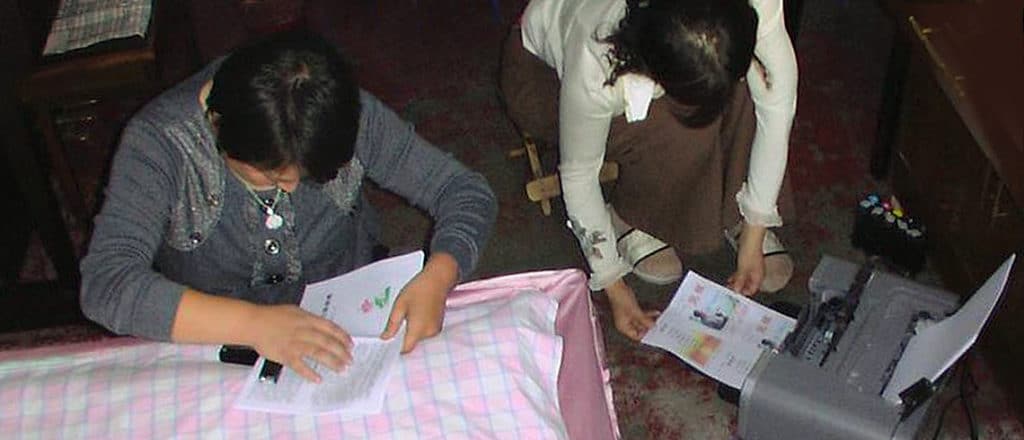
Civil Disobedience
For two decades, a grassroots movement consisting of tens of millions of people across China has peacefully challenged the hate and violence perpetuated by the Chinese Communist Party (CCP). These people risk everything to pull back the veil of lies and propaganda coming from communist state-run media.
This constitutes the largest civil disobedience movement in the world, and yet, most in the West know nothing about it.
The activities of this group include creating and distributing leaflets and DVDs, reporting abuses inside China to overseas volunteers, as well as organizing unprecedented petitions and legal complaints within China.
Documenting Persecution, Abuses

Third-party sources estimate that 20-40 million Chinese citizens continue to practice Falun Gong inside China. After the persecution began in 1999, these adherents, through sheer goodwill to dismantle the state-construed propaganda surrounding the spiritual meditation practice, voluntarily participate in grassroots human rights campaigns to expose the persecution of their faith. This scale of civil disobedience is at a level unprecedented in history.
Falun Gong adherents throughout China continue to regularly send detailed reports of the persecution that they or fellow believers have suffered to the outside world through Minghui.org, a website dedicated to reporting on the Falun Gong community worldwide. Despite heavy censorship and risk of reprisals, Minghui and its network of contacts have managed to establish a relatively secure and robust system for documenting abuses and transmitting updates from within China to overseas.
From January 2020 to March 2022 alone, approximately 3,000 first-hand reports of the persecution were published on Minghui. These reports include cases related to but not limited to detentions, indictments, sentencing, harassment, death, torture, brainwashing, extortion, and trespassing.
Engaging in Grassroots Public Education

After the persecution began in 1999, these adherents, through sheer goodwill to dismantle the state-construed propaganda surrounding the spiritual meditation practice, have since created 200,000 underground print houses to mass produce materials that uncover the truth.
The established printing houses are scattered throughout China, and volunteer Falun Gong practitioners produce leaflets, DVDs, and other materials daily to expose the persecution and debunk the state’s anti-Falun Gong propaganda. These sites are operated at a grassroots level across China, typically located in the back room of a private residence. Each site provides materials up to 1,000 Falun Gong practitioners, who then distribute the materials in their communities.
In addition to these campaigns, practitioners inside China have also engineered clever methods to disseminate information, aside from the usual pamphlets and flyers. In some provinces, practitioners use stamps to print “Falun Gong is Good” on dollar bills and banknotes. In urban areas, practitioners have used AirDrop and Bluetooth to send high quality pdfs and images clarifying the state propaganda against Falun Gong to the people riding public transit.





Undeterred by their unjustified mistreatment by Chinese authorities, Falun Gong practitioners in detention have continued to inform prison inmates, guards, wardens, police officers, police chief, lawyers, doctors, 610 Office director, court judges, officials, and other staff about the practice and persecution, thereby debunking the CCP’s propaganda and justification for oppressing the spiritual belief. In some cases, adherents and their lawyers have reported members of the security apparatus becoming more sympathetic and even taking steps to reduce the persecution faced by practitioners under their authority.
Criminal Complaints Filed Against Jiang Zemin
On May 1, 2015, new Supreme People’s Court guidelines took effect that require judicial authorities to accept criminal complaints submitted by individual citizens; previously, they were able to reject such complaints. After a number of articles on Minghui raised awareness of the change, large numbers of Falun Gong torture survivors began lodging criminal complaints that name former CCP leader Jiang Zemin as the one responsible for the persecution and call for him to be investigated.
By December 2015, more than 200,000 practitioners in China had filed criminal complaints against Jiang Zemin with their real names for his crimes against humanity. In Shandong Province alone, hundreds of Dafa practitioners have actively participated in the campaign. Many practitioners even took it upon themselves to collect petition signatures in their neighborhoods to sue Jiang. However, this movement has not been without backlash and reprisals. In one notable case, two women in Chaoyang City were sentenced to prison for filing criminal complaints against Jiang Zemin. Both were pronounced dead in 2020. One of them died six months after being released on medical parole, while the other died three days after being brought home unconscious.
“Tuidang” (or “Quit the Party”) Movement

In 2004, the dissemination of the book “Nine Commentaries on the Communist Party” by Falun Gong practitioners led to the Tuidang (or “Quit the Party”) movement. The publishers of the book encouraged Chinese citizens to make statements of quitting the Party, Communist Youth League, and Young Pioneers (most Chinese people have joined at least one of those at one point in their lifetimes). First-hand accounts by Falun Gong refugees indicate that this movement has become a centerpiece of the community’s grassroots effort.
An academic study from 2011 concluded that the Tuidang movement was not an attempt to overthrow the Party, but rather an effort to give Chinese people an opportunity to denounce the CCP’s violence and distance themselves from the authoritarian regime as a way of clearing their conscience and committing to future nonviolence. Many of those who make Tuidang statements do so using aliases, given the risk of retaliation, although some prominent rights activists and others have done so under their real names.
Practitioners in China and around the world assist Chinese citizens and members of the diaspora to quit the Party and its affiliated organizations by collecting their renunciations and submitting them to a website outside of China. Since its inception and through March of 2022, the Global Tuidang website had documented 393,744,844 statements of people who had quit the CCP or affiliated organizations. Although this figure could not be independently verified, Chinese court documents from early 2016 identify multiple cases in which Falun Gong adherents were sentenced to prison for possessing tuidang literature, indicating that the CCP itself is taking the movement seriously.
Many of those renouncing their affiliation with the CCP admit in their statements to having witnessed or participated in past atrocities. For example, Hu Shuyue from Liaoning Province witnessed the June 4th massacre in 1989. In his statement to quit the CCP and its organizations on January 8, 2020, he relayed the following:


After the army crushed the demonstrating students who refused to leave Tiananmen Square with their tanks, the ground was full of corpses and their belongings. The soldiers used trucks to cart away their belongings and helicopters to transport the remains. Then, dozens of fire trucks came to wash the blood off Tiananmen Square, and the authorities forbid anyone from telling the truth. Under military law, anyone who talked would be severely punished. Now that I have been retired from the military for decades, I dare to speak a little bit of truth to Falun Gong practitioners today. I believe what a Falun Gong practitioner has told me about the persecution of her faith and I took her advice to quit the CCP and its organizations. May the Divine bless our lives with peace, fortune, and safety in times of trouble.
Support from Non-Adherents in China

For nearly a quarter of a century, Chinese citizens have pushed back against the Party’s narrative of Falun Gong. Ordinary citizens who don’t practice Falun Gong have stepped up and risked their livelihoods to defend the innocent practitioners in their community. Human rights lawyers continue to represent Falun Gong cases, villagers collect hundreds of signatures to release their Falun Gong neighbors, police release or secretly protect arrested practitioners, employers resist government directives to discriminate against Falun Gong employees, family members raise awareness about the unfair treatment against their Falun Gong relative, and the list goes on.
Supportive family members
The community of practitioners is supported by the larger community they participate in, with the greatest support often stemming from the home. An entire family spanning four generations, with great-grandparents 90 years of age, resisted the Zero-Out campaign since December 2020 and spoke out against the local authorities who visited their home many times to coerce their grandmother and great-grandparents into renouncing their faith.
Local residents support Falun Gong neighbors
In August 2020, 415 villagers in Zhangjiakou City, Hebei Province signed an affidavit in support of Yang Jianlu, a Falun Gong practitioner who was arrested and sentenced to eight years for his faith. In the statement, the villagers said:
We are all shocked to hear about Yang Jianlu’s arrest. People in nearby villages all know that he practices Falun Gong and is a good person. Whoever needs help, he is always willing to lend a hand. We don’t know much about those sophisticated principles of Falun Gong, but we know that he didn’t do anything wrong by being a good person. He has been detained for nearly eight months. Please release him. Let his family reunite.
Similar community affidavits calling on the release of individual practitioners in the past have been signed by 205 villagers in Shandong Province, 1,670 residents in Hunan Province, over 3,000 citizens in Qinhuangdao City, and 5,145 people in Tianjin City. Despite their best intentions, these petitions of support are often met with government efforts to suppress the dissent. Benxi City police checked almost every household to threaten them into retracting their signatures. However, most villagers maintained their support for the detained Falun Gong adherent. One neighbor even said, “If you need signatures again, my entire family will sign!”
Human rights lawyers continue to represent Falun Gong clients
Since 2003, rights lawyers in China have been defending Falun Gong. Many of the most outspoken ones, such as Gao zhisheng, Wang Quanzhang, or Jiang Tianyong have themselves been detained, tortured, and disappeared. Multiple lawyers have lost their licenses for taking Falun Gong and other human rights cases. In 2020, guidance was issued to lawyers in Jilin Province explicitly telling them not to represent Falun Gong. Nevertheless, over the past two years, other lawyers have continued this effort in spite of the judicial repression of representation for Falun Gong cases.
Lawyers across the country still take up the mantle to protect the livelihood, safety, and civil rights of Falun Gong adherents in need. One notable case occurred in Nanchang City, Jiangxi Province, where a retired nurse named Xiong Meiyong was detained for distributing informational materials about Falun Gong. Upon Xiong Meiyong’s release in 2020, her vision had deteriorated due to the torture she experienced in custody. Her house had collapsed while she was in prison and all of her valuables had been stolen. The government also suspended her pension, so she had income. On October 22, 2021, Xiong went to court to appeal for her pension and her lawyer defended her constitutional rights as a retiree. The judge ended up ruling in favor of Xiong, and she was able to receive her pension.
These recent trends and incidents match previous documentation by Freedom House, Bitter Winter, and right lawyers’ own accounts and refugee testimony.
Police quietly help
Some police officers in China have also shown their support by quietly helping out Falun Gong practitioners in crisis. In late 2021, a 70-year old female practitioner went to a supermarket to hand out informational fliers, but was reported to police by high school students and a crowd quickly formed to see the confrontation. But when the police arrived, they just escorted her out of the crowd and reassured her, “Go with us for a while, and then you can just turn the corner and head home.” Also in 2021, when three practitioners were arrested by local police in Shandong Province, one officer persuaded his police director to release them instead of interrogating or detaining them. There are even anecdotes of entire police stations across China, from the bureau director to individual police officers, that refuse to arrest or pressure Falun Gong practitioners.
Falun Gong Diaspora
For more than two decades, Falun Gong communities and supporters in dozens of countries have also mobilized efforts to expose the persecution in China. Those efforts continued in greater numbers over the past two years. You can find more information:




